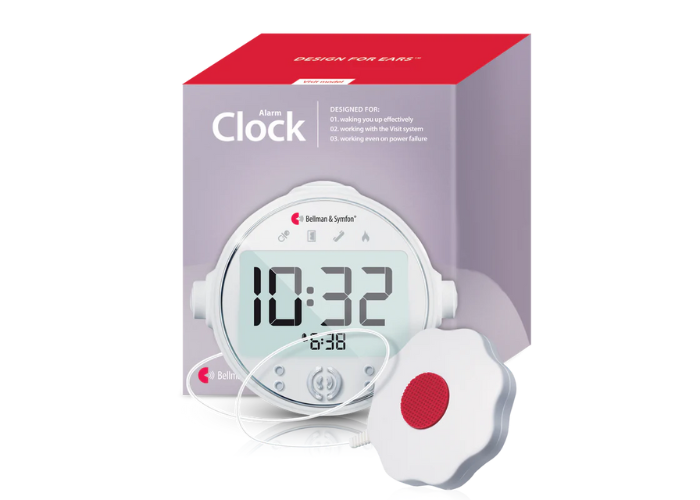Getting up on time is crucial, but traditional alarms simply don't work for those who are deaf or hard of hearing. A vibrating alarm clock is a game-changer for deaf users, offering reliable solutions for waking up without the need for sound. This guide explores the benefits, features, and top options, ensuring your mornings are as smooth as possible.
The Need for a Vibrating Alarm Clock for Deaf Individuals
Waking up to a buzzing alarm may seem trivial to most, but it's a significant challenge for individuals with hearing impairments. Conventional alarms rely on loud sounds that often go unnoticed by people who are hard of hearing.
This is where alarm clock for hard of hearing users shine. They utilize tactile vibrations, flashing lights, or a combination of both to ensure a seamless wake-up experience. For many, these clocks aren't just devices but tools of independence and empowerment.
How Does a Vibrating Alarm Clock Work?
These innovative devices employ advanced technology to wake you up without relying on sound:
- Vibration Mechanism: Most models include a bed shaker—a small device placed under your pillow or mattress that vibrates at the set alarm time.
- Visual Alerts: Bright, flashing lights accompany the vibration, which is especially useful for deep sleepers.
- Adjustable Intensity: Users can customize the strength of vibrations and brightness levels.
Key Benefits of Vibrating Alarm Clocks
Investing in a vibrating alarm clock for deaf individuals offers numerous advantages:
- Reliable Wake-Up Calls: Never miss another morning appointment or work shift.
- Customizable Alerts: Tailor the alarm with adjustable vibrations and lights to suit your preferences.
- Inclusivity: These clocks are designed specifically for deaf people, promoting independence.
- Portability: Many models are compact, making them travel-friendly.
Top Features to Look for in a Vibrating Alarm Clock
When shopping for an alarm clock for hard of hearing, keep an eye out for these must-have features:
- Power Source: Choose battery-powered, plug-in, or dual-powered models for added reliability.
- Multiple Alerts: Look for a clock that combines vibrations, lights, and sound for versatility.
- Ease of Use: Opt for models with intuitive controls and transparent displays.
- Smart Integration: Some advanced options conveniently sync with smartphones or smart home systems.
Types of Vibrating Alarm Clocks
From simple models to advanced smart devices, there's a variety of vibrating alarm clocks to suit every need:
- Basic Bed Shaker Clocks: These come with a vibration unit and a basic digital clock interface.
- Light and Vibration Clocks: Combines flashing lights with vibrations, perfect for heavy sleepers.
- Smart Alarm Clocks: These sync with your smartphone to offer additional features like weather updates or reminders.
Top Brands Offering Vibrating Alarm Clocks
Several reputable brands cater to the unique needs of deaf people. Here are some trusted names:
- Sonic Alert: Renowned for its strong vibrations and bright light alerts, Sonic Alert is a go-to choice for many users.
- Bellman & Symfon: Offers sleek designs with robust wake-up solutions and easy-to-use interfaces.
- Serene Innovations: Known for clocks that integrate with other assistive devices for a comprehensive experience.
How to Set Up a Vibrating Alarm Clock
Getting started with your new alarm clock is simple:
- Choose the Right Spot: Place the bed shaker under your pillow or mattress, ensuring it's close enough to wake you up.
- Set the Time and Alarm: The intuitive controls program your desired wake-up time.
- Adjust the Settings: Customize vibration intensity, light brightness, and any accompanying sound alerts.
- Test the Device: Run a trial to ensure the settings suit your preferences.
Making the Most of Your Vibrating Alarm Clock
To maximize the effectiveness of your vibrating alarm clock for deaf users, consider these tips:
- Combine Alerts: Use both vibration and light settings for better results.
- Regular Maintenance: Clean the device regularly to keep it functioning optimally.
- Check Batteries: Ensure backup batteries are fully charged, especially for travel.
- Incorporate Smart Features: Explore additional functions like syncing with your smartphone for reminders or secondary alarms.
Why Smart Alarm Clocks Are Gaining Popularity
Smart alarm clocks represent the future of assistive technology. These devices wake you up, integrate with apps, notify you of missed calls or messages, and even display weather updates. For the tech-savvy user, they're a perfect blend of functionality and innovation.
Tips for Choosing the Right Alarm Clock for Hard of Hearing Users
To ensure you pick the best option for your lifestyle, ask yourself these questions:
- How Deep Do You Sleep? If you're a heavy sleeper, prioritize models with stronger vibrations.
- Do You Travel Often? Compact and battery-operated models are ideal for on-the-go use.
- Do You Want Smart Features? If you use other smart devices, choose a clock that integrates seamlessly.
- What's Your Budget? Affordable options exist without compromising on essential features.
Affordability and Accessibility
While some high-tech alarm clocks have hefty price tags, there are plenty of budget-friendly options available. Additionally, nonprofits and government organizations may offer subsidies or grants to make these devices more accessible.
Empowering Mornings with Vibrating Alarm Clocks
A vibrating alarm clock is more than just a timepiece; it's a tool that empowers deaf individuals to manage their mornings independently. With customizable features and reliable alerts, these devices ensure you always start your day on the right note.
Conclusion
Waking up doesn't have to be a struggle for the deaf or hard of hearing. A vibrating alarm clock for deaf individuals offers an inclusive and reliable solution, empowering users with customized alerts tailored to their needs. Whether you're looking for simplicity or advanced innovative features, there's an option for everyone. Choose the right device today and transform your mornings into a stress-free experience.





Comments